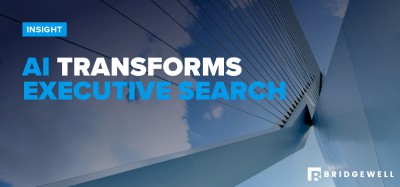AI Transforms Executive Search
18 july 2023

With its ability to process vast amounts of data, analyze patterns, and make intelligent predictions, AI is transforming the executive search business by enhancing efficiency, expanding the talent pool, and ultimately leading to more successful placements. In this article, we explore the significant ways in which AI is reshaping the executive search landscape.
Enhancing Efficiency and Accuracy
AI-powered algorithms and machine learning systems are streamlining the search process, enabling executive search firms to operate with greater efficiency and accuracy. AI algorithms can quickly scan and analyze massive amounts of data, including resumes, social media profiles, professional networks, and online publications. This enables recruiters to identify potential candidates more effectively, reducing the time and effort required to source and screen candidates manually. By automating routine tasks, AI frees up recruiters' time, allowing them to focus on high-value activities such as building relationships and assessing cultural fit.
Traditional executive search methods often relied on personal networks and referrals, limiting the pool of potential candidates. AI technology is breaking down these barriers by tapping into vast online resources and uncovering hidden talent. AI-powered platforms can search across various platforms, databases, and social networks to identify qualified candidates who may not be actively looking for new opportunities. This expanded reach allows executive search firms to present their clients with a more diverse and comprehensive pool of talent, increasing the likelihood of finding the perfect match.
AI leverages data to make informed decisions and predictions, enabling executive search firms to assess candidates more objectively. By analyzing historical data on successful placements and correlating it with various attributes, AI algorithms can identify patterns and characteristics associated with high-performing executives. This data-driven approach helps mitigate bias and subjective judgments, leading to more objective and informed decision making. AI algorithms can even predict a candidate's likelihood of success based on various parameters, offering valuable insights to recruiters and clients.
Improving Candidate Experience
AI technology is enhancing the overall candidate experience during the executive search process. Chatbots and virtual assistants powered by AI can handle initial candidate interactions, answering frequently asked questions and providing information about the role and the organization. These AI assistants can guide candidates through the application process, schedule interviews, and provide timely updates. By providing a seamless and personalized experience, AI ensures that candidates feel valued and engaged throughout the recruitment journey.
Unconscious bias is a challenge in the executive search process, potentially limiting diversity and inclusion efforts. AI algorithms can help address this issue by focusing on objective criteria and removing bias from the initial screening process. By analyzing candidate data solely based on qualifications and relevant experience, AI can minimize the impact of unconscious bias and promote fairer hiring practices.
As AI continues to evolve, its impact on the executive search business will only become more significant. The combination of advanced algorithms, machine learning, and data analytics empowers executive search firms to identify the most suitable leaders more efficiently, expand the talent pool, make data-driven decisions, improve candidate experiences, and mitigate unconscious bias. By embracing AI technology, executive search firms can navigate the dynamic business landscape, helping organizations secure top-tier talent and drive success in an increasingly competitive environment.
